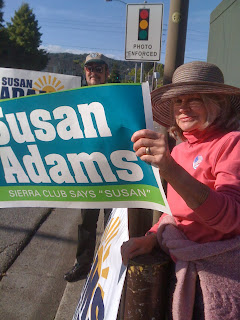You
may think with all the new absentee registrants, up to 80% in some Districts,
that there’s not much you can do in the final days of the campaign to influence
voters. After all haven’t most of hem case their ballots already?
You’d
be wrong.
An
increasing number of permanent absentee voters are holding on to their ballots
until the week before Election Day, many opting to walk them into the precinct
place themselves.
Last
minute campaigning can make all the difference, especially in close races. I know. As a campaign consultant I have seen
razor thin races decided in the weeks following the election, when the late
absentee and provisional ballots are counted.
Because of that, you need to keep on campaigning down to the wire. Here are some tips to be sure you are prepared to campaign til the end:
- Have a good campaign plan in place early with your late precinct walking, phoning, last minute mail drops and GOTV built in.
- Budget wisely. Make sure you have sufficient funds for late contingencies. Never stop fundraising. Your biggest donors may well be the most wiling to help fund last minute mail or robo calls
- Treat your volunteers well, so they are not burned out by the last week. You will need them to make those last phone calls and walk those last precincts
- Be ready to respond to a negative attack ad or mail piece by having sufficient funds to strike back.
- Cultivate a good relationship with the press, so you are assured of coverage for the late breaking stories with a positive spin for you.
- Letters to the editor can keep coming through that last important weekend. Have someone ready to write them and others to sign them.
- Check with the Registrar’s office for names of those who have already voted and purge them from your lists.
- Get the weekly lists of new absentee applications and send a special piece of mail, even a short note from the candidate personally to them.
- Save enough signs for a visibility program and last weekend “Honk and wave” events at key intersections.




